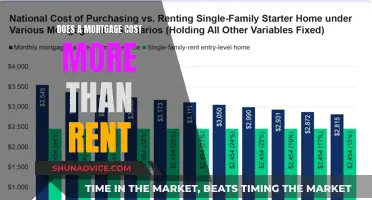
There is some debate about whether a house with a mortgage counts as an asset. Some sources claim that a house is an asset because it is something you own that has value. However, others argue that a house with a mortgage is a liability because it takes money out of your pocket each month in the form of mortgage payments, property taxes, insurance, and maintenance costs. This debate has been influenced by Robert Kiyosaki's book, Rich Dad Poor Dad, in which he defines an asset as something that puts money in your pocket. According to this definition, a house with a mortgage that you live in is not an asset because it does not generate cash flow. Lenders will consider various factors when evaluating a mortgage application, including assets, income, and net worth.
What You'll Learn

A house is an asset
There is significant debate surrounding whether a house with a mortgage counts as an asset. Some sources argue that a house is an asset because it is something you own that has value. According to accounting standards and common definitions, assets are items that have monetary value and can be sold for funds. This includes physical assets like properties, homes, cars, and jewellery, as well as non-physical assets like stocks and 401(k)s. Lenders consider these when assessing mortgage applications and calculating an individual's net worth.
However, others argue that a house is a liability because it takes money out of your pocket in the form of a mortgage, taxes, insurance, and maintenance costs. These costs can be significant, and if you are unable to keep up with them, you may have to sell the house or face foreclosure. Additionally, house prices can decline, and improvements may not increase the sale price, making it challenging to sell a house at a profit.
Some sources propose a nuanced perspective, suggesting that a house can be both an asset and a liability. While a house may have value and can be sold to generate funds, it also incurs ongoing expenses. Therefore, a house can be considered an asset in the context of ownership and value, but a liability in terms of the financial burden it imposes.
It is essential to understand the difference between assets and liabilities when planning for your financial future and applying for a mortgage. Consulting with a financial advisor can help clarify your specific situation and guide your decision-making process.
Mortgage Dips: What's the Real Deal?
You may want to see also

A mortgage is a liability
There is a clear difference between assets and liabilities in the financial world. Assets are items of monetary value that are owned by an individual or business. Liabilities, on the other hand, are financial obligations or debts that must be paid off. In the context of a mortgage, it is clear that a mortgage is a liability.
When an individual takes out a mortgage, they are essentially taking on a debt with the expectation of future repayment. This debt is a long-term financial obligation that typically spans several years, if not decades. The borrower is legally bound to make regular payments, including interest, towards the repayment of this loan. Therefore, a mortgage represents a financial liability or a debt that must be serviced through regular payments.
While a house can be considered an asset, the mortgage associated with it is a separate financial instrument. The house itself, as a physical property, has value and can be considered an asset. However, the mortgage is the debt incurred to acquire that asset. This distinction is crucial when discussing assets and liabilities.
The argument that a house is an asset stems from the fact that it holds value and can be sold or rented to generate income. In accounting, an asset is typically defined as something that has value and is owned by an individual or entity. A house fits this description, especially if it is used as an investment property. However, when a mortgage is involved, the equity in the house is reduced, and the outstanding loan amount becomes a liability.
In conclusion, while a house can be considered an asset, the mortgage associated with it is clearly a liability. The mortgage represents a financial obligation or debt that must be repaid over time. This distinction is important for financial planning, net worth calculations, and understanding the true value of one's assets and liabilities.
Cosigner Impact: Mortgage Approval and Beyond
You may want to see also

Appreciation is not guaranteed
A house is an asset if it puts money in your pocket. If you are living in your home, it is not making you money. It is a liability because it takes money out of your pocket each month in the form of a mortgage, taxes, insurance, and maintenance costs. Even if you pay off your mortgage, you will still have to pay upkeep and taxes on your home.
A home can be considered an asset if it is rented out because it brings in cash flow. However, this is not guaranteed, as finding tenants who are willing to pay a reasonable price for rent may take some time. If you are unable to find tenants, you will be paying those expenses out of pocket, and the longer you go without tenants, the more money you will spend.
If you are thinking about your net worth, your primary home should be considered an expense. However, a home can be considered an asset when calculating your overall net worth, as it is something you own that has value. Lenders will take all of your assets into consideration when you apply for a mortgage, and your net worth allows a lender to get a better picture of how you will make your mortgage payments, down payment, and closing costs.
Growing Equity Mortgage: Understanding Caps and Limits
You may want to see also

A home is an investment
There are differing opinions on whether a home is an investment. Some sources state that a home is an asset, while others argue that it is a liability. According to accounting definitions, an asset is something that you own and that has value. In this sense, a home is an asset. However, some people argue that a home is not an asset because it does not put money in your pocket. Instead, it takes money out of your pocket in the form of a mortgage, taxes, insurance, and maintenance costs.
Those who consider a home an asset point out that most real estate appreciates over time, so the selling price will be greater than the purchase price. This creates equity in the property, which is real money when the property is sold. Additionally, when you rent a place to live, that money is gone forever, whereas owning a home can be cheaper than renting in the long term.
On the other hand, those who consider a home a liability argue that if you have to sell a home with an outstanding mortgage, you may end up with nothing once you have paid off the mortgage and covered all the associated costs. They also point out that a home does not generate a monthly cash flow like an investment property would. Instead, it is an expense that takes money out of your pocket each month.
It is worth noting that a home can be considered an asset when calculating your net worth, as it contributes to the overall value of what you own. However, when crafting an income statement for retirement, a primary home is typically listed under expenses. This is because it does not generate retirement income, and selling it would require moving elsewhere and incurring additional costs.
Overall, whether a home is considered an investment depends on one's perspective and individual circumstances. While a home can appreciate in value and provide certain benefits over renting, it may not generate a direct monthly income or provide the same level of liquidity as other investments.
Deed and Mortgage: What Does the Paper Trail Show?
You may want to see also

Net worth calculation
Net worth is the value of all your assets minus the total of all your liabilities. In other words, it is what you own minus what you owe. If you own more than you owe, you will have a positive net worth, and if you owe more than you own, you will have a negative net worth.
Assets are owned properties with value. This includes cash, retirement accounts, investment accounts, cars, and real estate. Liabilities, on the other hand, are financial debts that are a drain on your net worth. They include credit card debt, student loans, mortgages, and auto loans.
There is some debate about whether a house with a mortgage counts as an asset or a liability. By a strict accounting definition, a home is an asset because it is something you own that has value. However, in reality, it is a bit more complicated. If you are paying a mortgage, property taxes, utilities, and maintenance costs on a home, it could be argued that the home is not an asset because, if you sold it, you might not make a profit once you've paid off the mortgage and other associated costs. On the other hand, as you pay off your mortgage, you build equity in the property, which represents real money when the property is eventually sold. Additionally, most real estate appreciates over time, so the selling price will likely be higher than the purchase price.
Some people define an asset as something that puts money in your pocket, meaning that a house with a mortgage may not be considered an asset by this definition, as it takes money out of your pocket in the form of mortgage payments, taxes, insurance, and maintenance costs. However, others argue that the house you live in does put money in your pocket because the alternative is renting, which is usually more expensive than the mortgage on a home.
When calculating your net worth, you can include your home as an asset if you are willing to use it for a home equity line of credit or sell it if needed. In this case, the mortgage on the house would count as a liability. The part of the house that you own is an asset, but the part that you owe is a liability because debt creates risk.
Divorce Decree and Mortgage: Who Takes Priority?
You may want to see also
Frequently asked questions
A home with a mortgage is generally considered an asset as it is something you own that has value. However, it can also be seen as a liability because it takes money out of your pocket each month in the form of mortgage payments, taxes, insurance, and maintenance costs.
A home is an asset because it is something you own that has value. It is also an asset when considering your net worth.
A home with a mortgage is a liability because it takes money out of your pocket. The money spent on mortgage payments, taxes, insurance, and maintenance costs is money going out of your pocket.
Yes, a home can be seen as both an asset and a liability. While a home has value and is something you own, it also requires regular payments to be maintained, which can be considered a liability.
When applying for a loan, lenders will consider all your assets, including physical assets like properties, homes, cars, and jewellery. They will also take into account your credit score, total monthly debt, and total monthly income.







